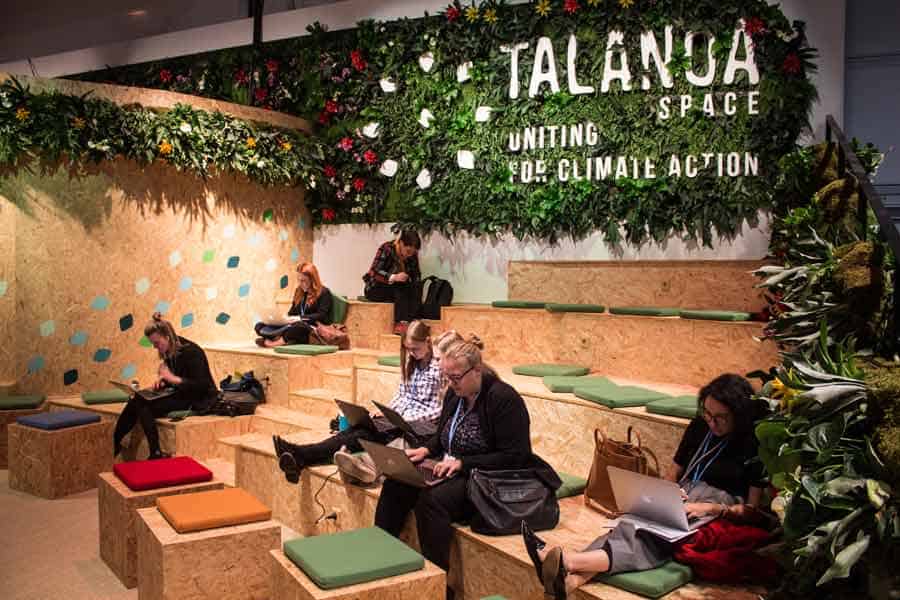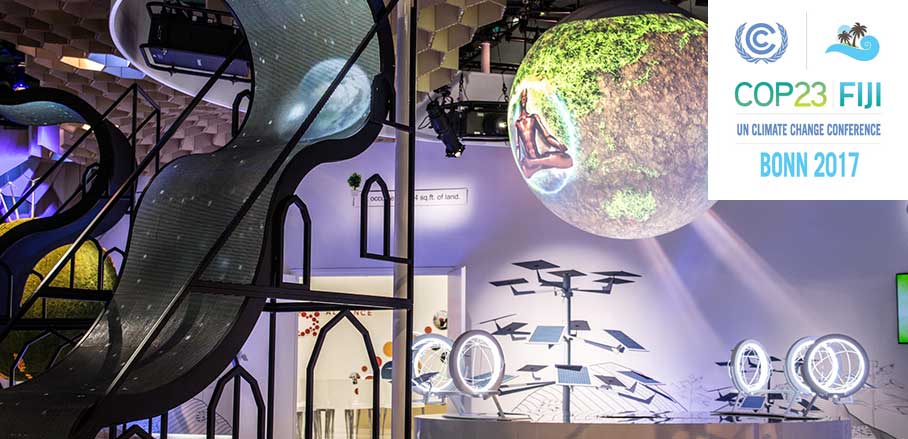COP23 enters second week: island states stress urgency to act
By Lou del Bello
COP23 continues into its second week: Rising ambition for climate protection is not enough, say mayors as cities, regions and business claim their place at the UN table. Being at the frontline of climate change impacts, island states call for urgent practical actions. Lou del Bello reports from Bonn.
A Fijian canoe sitting at the heart of the “Bula” conference venue in Bonn, Germany is meant as a symbol of resilience and unity. But in the current political scenario where cooperation is threatened by a major economy pulling out of the Paris Agreement, it also inevitably reminds of the perilous journey ahead.
After a week in which UN parties, cities associations and civil society have been mostly engaging in blue sky thinking on what is needed to meet the Paris targets, the coming days will tell whether real progress will be made. Main issue on the table, the architecture of a [inlinetweet prefix=”” tweeter=”URBANET” suffix=””]new ‘facilitative dialogue’, dubbed Talanoa by the Fijian hosts, will guide the process of increasing global commitments[/inlinetweet] in a concerted manner. Talanoa, the delegation explained, is a traditional approach used in the Pacific region to build empathy and trust through constructive exchange, making sure goals are shared and no one is left behind.

Talanoa space at COP23 © Lou del Bello
The role of non-state actors
As government representatives come in for the second part of the negotiations, cities, regions and businesses remain protagonists of what will otherwise be a “process heavy” COP, whose expected outcomes are the key foundation for more conclusive decisions in 2018 and 2020.
“They may be called non-state actors in this process, but make no mistake, they are leading actors in driving more ambitious climate actors in the states and cities, in this critical pre-2020 period” said the COP president and Fijian Prime Minister Frank Baininarama, addressing the audience at the launch of the America’s Pledge initiative. The brainchild of the We Are Still In coalition, the initiative aims to boost cooperation between local entities and businesses in the US, bypassing the federal state that is “dragging its heels” on climate change, as patron Michael Bloomberg put it.
But American cities are not alone in showing leadership and reclaiming their rights to take part in the UN proceedings. Representatives of regional networks and mayors from all over the world – including vulnerable island states – have pitched their ideas on how to increase ambitions from the bottom up. And this time it’s not just a call for more finance.
Identifying common needs of cities and islands
“Before talking finance, we want to sit and discuss in a Talanoa format”, said Carlisle Richardson, special adviser to the cities network ICLEI Oceania.
Richardson is part of a [inlinetweet prefix=”” tweeter=”URBANET” suffix=””]new twinning initiative for the implementation of effective local measures in cities and islands[/inlinetweet] at the frontline of climate impacts. “We are connecting coastal cities all over the world with Island communities”, he said. From Sweden to Fiji, “we have the same interests and the same concerns. Implementation is key: we will eventually need financing, but at this stage what’s more important is identifying the needs and how to address them.” Starting with small scale projects, Richardson finds, allows to grow on a more secure footing, because initial planning mistakes can be corrected easily. He hopes that the project, called Frontline Cities and Islands, will showcase early results within just a year.

Two Fijian fishermen at COP23 © UNclimatechange (Flickr CC BY-NC-SA 2.0)
Energy independence: Switching to local resources
Not only the aggregate number of small initiatives kick-started this year can make a dent in the emission gap the world needs to bridge, but it is also a way to foster development and resilience. In the case of the small island states, for example, switching to local sources of clean energy such as the sun, the ocean or the natural heat coming from the ground would also mean becoming energy independent. “I would like to see businesses in the island communities tap into their own resources, rather than rely on import” Richardson said.
Bernie Cotter, managing director of ICLEI Oceania, noted that energy independence also boosts resilience: “Pacific islands are most vulnerable to extreme weather. After cyclones and tsunami all of those transportation routes for imported oil are knocked over, so it’s very important to have local supply to fall back on”.
The voices of networks such as ICLEI or the Covenant of Mayors, also present at COP with a series of side events, will feed into the UNFCCC process through the Marrakech Partnership for Global Climate Action, launched last year and due to be further developed this week. The new platform makes space for non-party actors to connect, report and measure progress, informing national and international politics.
For most vulnerable states, time is running out
But while industrialised nations in America or Europe can afford to play the long game and ramp up their actions over time, for vulnerable states this COP is one of the last opportunities to remind the world that for them, climate change is a matter of life or death.
“By now we have collected a wealth of information showing how island states need urgent action” said Sunael Purgus, chairperson of the district of Pamplemousses in the Mauritius. “You can tell me this is a slow process, but we have no time”.
Purgus said that because the negotiations are not going to proceed fast, the whole climate community gathered at COP, including delegates of industrialised nations, should focus primarily on practical solutions. Despite a number of locally-led initiatives launched last week, Purgus remains sceptical: “I don’t think this is happening”, because non-party actors are still relegated to the fringes of high level debate.
“It’s important for all island states to come together and work out how to implement and monitor projects on the ground.” Purgus said. “2020 is not far and we want to see the real action being taken”.
Although this year’s COP can be considered just a stepping stone towards a stock-tacking process that will take place next year, and will assess how countries are doing against their objectives, cities and regions have emerged from Bonn as one powerful voice. Through a myriad of twinning initiatives and the establishment of networks that bring together the majors of regions and entire continents, non-party actors may well embody that ideal of unity that still seems so elusive to the UN delegates.
- COP27: Equipping Today’s Cities for Tomorrow’s Climate Crises - 21. November 2022
- At COP26, Cities were Climate Action Watchdogs - 23. November 2021
- COP24: What Does it Mean for Cities and Regions? - 17. December 2018
